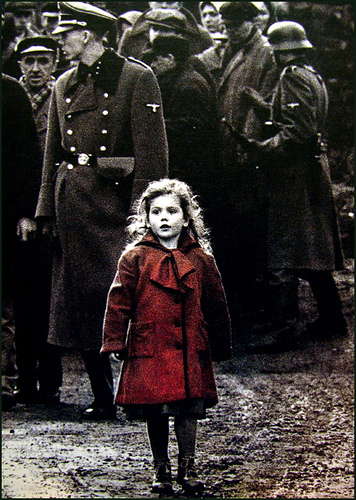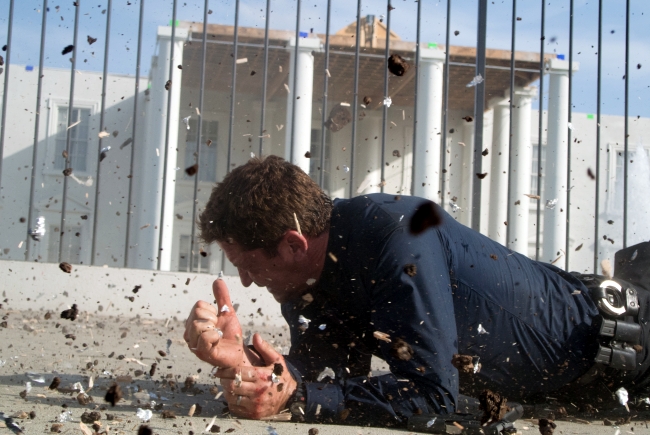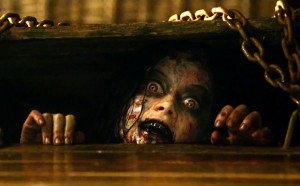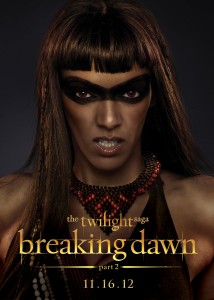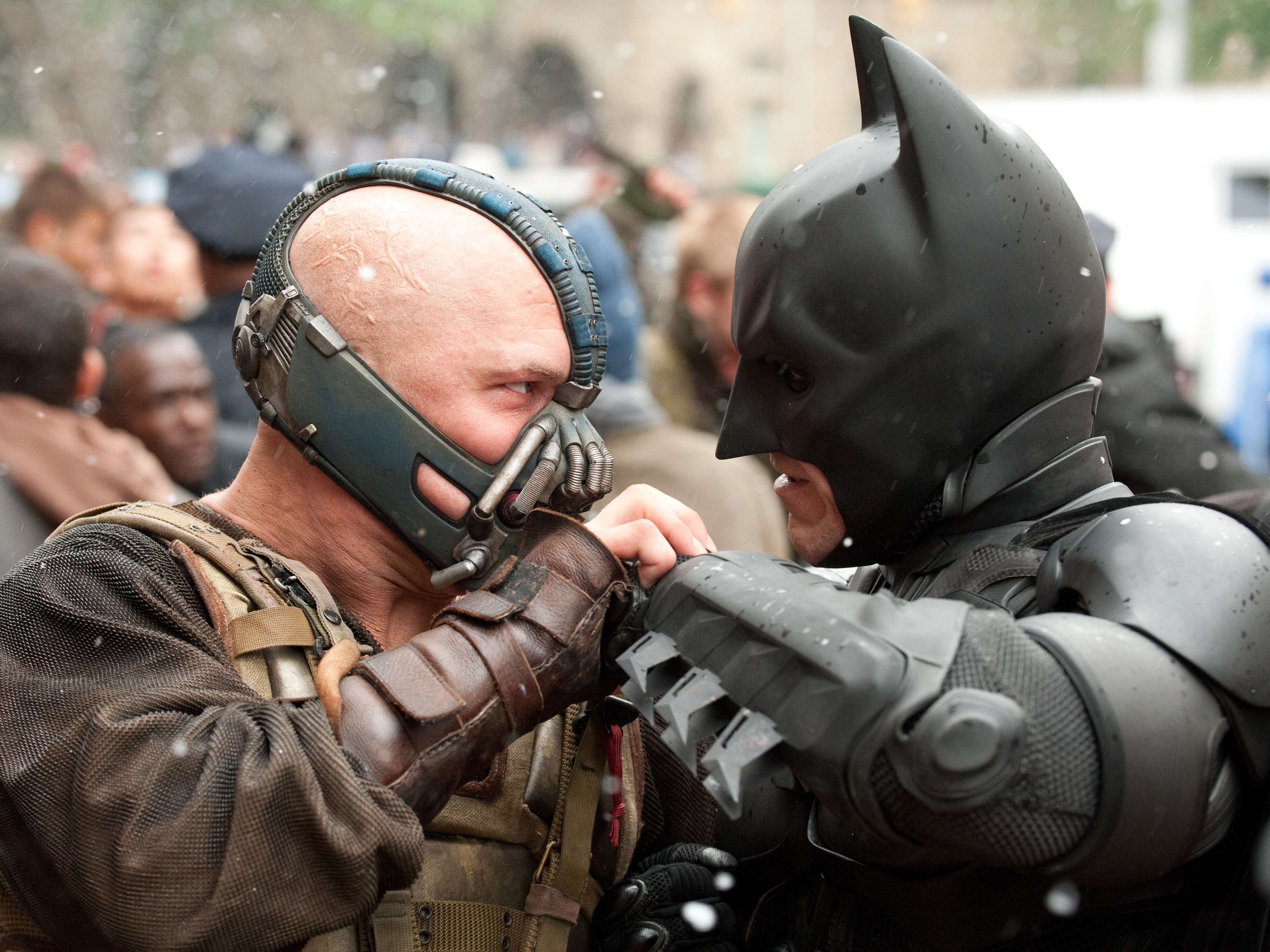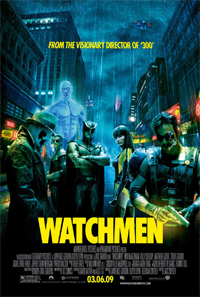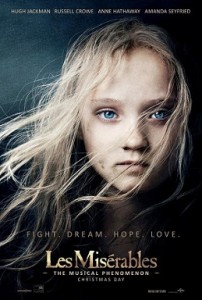
Les Miserables
Directed by Tom Hooper
I read Les Miserables during a study abroad program in Paris, but I had never seen the musical before watching the 2012 film a few weeks ago. The experience was an interesting one, mostly because I would have never believed Victor Hugo’s novel to be ideal for adaptation, and especially not into a musical. There are countless asides, mini-treatises, and lengthy tangents, like the chapter devoted to the Battle of Waterloo. The musical throws all of that out and focuses on the plot and the central characters.
The end result is a mixed bag. Part of me is happy that I didn’t have to sit through the musical riff of Victor Hugo describing the sewers of Paris. On the other hand, removing all those asides made the musical feel less rooted, less historical, and above all less French. The novel is about Fantine and Marius and Jean Valjean obviously, but it’s also about French history, geography, revolutions, Catholicism, and Hugo’s efforts to bind it all together. The musical is draped in the tricolor, and the religious and revolutionary themes are still there, but they felt cursory and disconnected in comparison to the book. And when there’s nothing to distract you from the main plot, it’s hard to ignore the many contrivances, or Hugo’s less than progressive attitude towards women.
This particular version of Les Miserables has its own share of problems. Director Tom Hooper was way too fond of close-ups, the editing was a mess during the group songs, and the actors were hit or miss in their musical performances. But for all my complaints, I found it to be a reasonably enjoyable way to fill some time. It helped that I saw it with someone who’s very enthusiastic about the musical, and I’ll admit that several of the songs are catchy. And since I’ve never seen (and still haven’t seen) the musical, my expectations were about as low as can be.
What follows are my thoughts on the singer/actors:
Hugh Jackman as Jean Valjean: I always imagined Jean Valjean as a big, stocky man, so Hugh Jackman would not have been my first choice for the role. But he’s a decent singer (if a bit too much warbling), and his acting performance was solid. And I’ll admit there’s something inherently awesome in seeing Wolverine in a musical.
Anne Hathaway as Fantine: Hathaway received a lot of praise (and an Oscar) for her performance. As much as I would like to be the contrarian, most of the praise is deserved. As Fantine, Hathaway had one of the most demanding songs, “I Dreamed a Dream.” It requires a powerful voice, and Hathaway’s version is rather weak when you listen to it as a single. Having now heard several other singers tackle it (including Susan Boyle), I wouldn’t rank Hathaway anywhere near the top. But within the context of the film, her version is excellent. The song occurs right after Fantine’s first night as a prostitute. Hathaway’s voice breaks, she fails to hit the right notes, yet the song feels perfect in the moment. A more polished, “ready for the album” version would have actually been strange and discordant. So by emphasizing Fantine’s despair and downplaying the show-stopper nature of “I Dreamed a Dream,” Hathaway actually made the most of her singing limitations.
Russell Crowe as Inspector Javert: Crowe had the same problem as Anne Hathaway. He has a VERY limited range as a singer but his role includes the song “Stars,” which requires a broad range and a booming voice. And Crowe just blows it. You can tell he’s trying his hardest, but he’s horribly outmatched by the song and what’s required of him. Crowe’s not much better in the rest of the movie, but at least he only has to “sing-talk” his lines. Tom Hooper probably cast Crowe because he’s a big star and headlines a rock band called The Ordinary Fear of God. After listening to a few of their singles (each one more horrible than the last), I’m left with only one conclusion: Hooper must be a fan of actors with vanity bands. Maybe his next movie will have Keanu Reeves. Or Kevin Bacon!
Amanda Seyfried as Cossette: Cossette is a thankless role. She has nothing to do and is barely even in the movie. The men in her life obsess over her, but the audience is never given any reason to care. I’d feel sorry for Seyfried, but she doesn’t help matters. Seyfried seems to think that she can make up for the paucity in her role by singing every line at the highest register, so we’ll remember the character after our ears stop ringing. She butchers her duet with Marius (Eddie Redmayne) and is generally unpleasant to hear.
Samantha Barks as Eponine: Pretty much steals the show. She’s one of the best singers in the cast and completely nails her big number, “On My Own.” To be fair, Barks is a ringer, having already played Eponine on the stage. And Eponine is among the most complex and sympathetic characters in Les Miserables, despite being a side character who gets passed over for the irresistible Cossette. But there is an odd problem with the casting. Victor Hugo described Eponine as gaunt and boyish, a product of poverty and malnutrition. It’s easy to understand why Marius would be oblivious to her affections. But Samantha Barks isn’t gaunt; she’s a knockout. And that means it’s hard to believe that Marius, or any straight man with working eyes, would be indifferent to her flirting. Suspension of disbelief only goes so far.
Sacha Baron Cohen as M. Thenardier: I understand why Sacha Baron Cohen was cast. He’s goofy looking, and the Thenardiers are the comic relief. What I don’t get is why Sacha Baron Cohen has a mock-French accent in the first half of the movie and a bad Cockney accent in the second half. I’ve been told that some stage versions of Thenardier use the mock-French accent, so maybe Cohen is simply following the example set by other performers. But it isn’t funny, partly because it doesn’t make sense that only one character sounds vaguely French while everyone else speaks with an English accent. Or maybe I don’t think it’s funny because I don’t think Sacha Baron Cohen is particularly funny.
Eddie Redmayne as Marius: quite good in his performance. The character of Marius annoys the hell out of me, but Redmayne does a great job and is a fantastic singer.

